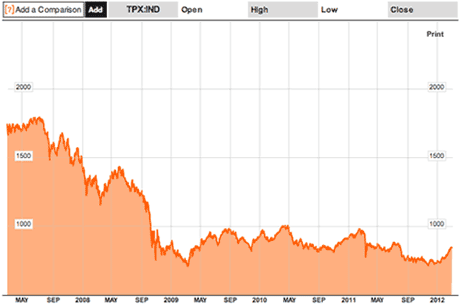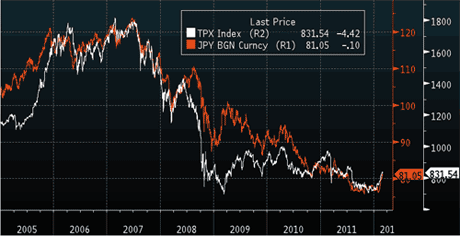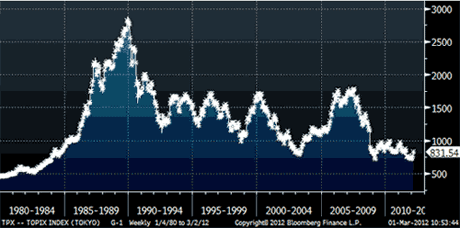Is Japan’s bear market at an end?
Japan’s stock market looks to be on the rise again after decades of decline. So is this a real turning point, or just another false start? Cris Sholto Heaton investigates.

Get the latest financial news, insights and expert analysis from our award-winning MoneyWeek team, to help you understand what really matters when it comes to your finances.
You are now subscribed
Your newsletter sign-up was successful
Want to add more newsletters?

Twice daily
MoneyWeek
Get the latest financial news, insights and expert analysis from our award-winning MoneyWeek team, to help you understand what really matters when it comes to your finances.

Four times a week
Look After My Bills
Sign up to our free money-saving newsletter, filled with the latest news and expert advice to help you find the best tips and deals for managing your bills. Start saving today!
Most investors will tell you that great bear markets end in maximum fear. There is a final cathartic flurry of activity as the remaining optimists dump their holdings and at that point the market is primed to rebound.
But look carefully at past bear markets and this rarely seems to be the case. In Anatomy of the Bear probably the best book written on this subject Russell Napier studied sentiment during the turning points of Wall Street's greatest bear markets and concluded that the bottoms were marked not by revulsion but by disinterest.
The end comes when investors have no desire to buy equities, the market has simply stagnated and nobody has any faith that it will recover.
MoneyWeek
Subscribe to MoneyWeek today and get your first six magazine issues absolutely FREE

Sign up to Money Morning
Don't miss the latest investment and personal finances news, market analysis, plus money-saving tips with our free twice-daily newsletter
Don't miss the latest investment and personal finances news, market analysis, plus money-saving tips with our free twice-daily newsletter
All of this is rather interesting given what's being going on in Japan lately.
A rally that's come out of nowhere
Japanese stocks have been very solid performers in 2012 so far, with the Topix up almost 13%. And while this hasn't gone totally unnoticed, there certainly hasn't been a great deal of comment on it.
To put that in context, see the chart below of the Topix over the last five years. Even though I'm very familiar with this graph, it's still striking every time I see it. In contrast to the rest of the world, Japanese equities have essentially staged absolutely no recovery from the lows of 2008-2009.

Source:Bloomberg
You may well be showing a decent return on any Japanese investments you hold. But unless the individual stocks have been doing something exceptional, that's entirely due to the currency performance.
As an equity investment, Japan has been a terrible decision over the last few years. And the fact that many of us have been bailed out by currency gains cannot disguise that.
The strong yen is of course one reason why the Japanese market has performed so poorly. Japanese exporters have seen their competitiveness eroded by Korean rivals who benefit from a far cheaper won. The Topix and the yen have had an inverse relationship since 2005 stocks have generally performed better when the yen weakens and fallen as it continued to strengthen.

Source: Bloomberg
On top of this, of course, there was the earthquake and nuclear reactor accidents almost a year ago (you can see very obviously when this happened on the chart above). This has done severe short-term damage to the economy and badly hurt confidence within Japan.
But there's more to it than this. We don't really need to review the performance of the Japanese market since 1990 most investors know it as an endless series of false hopes and doomed rallies. For a reminder, see the chart below.

Source: Bloomberg
However, in the last three years we've seen little of that. Instead, the market has just trod water while any optimism has vanished. It seems near impossible to find anyone upbeat about prospects for Japanese stocks.
It's interesting that, even though stocks have rallied somewhat this year, most analysts are apparently treating this solely as a result of a slightly weaker yen. The possibility that the Topix could improve much further seems to be viewed as a long shot.
Four reasons for hope
Now, there's no doubt that Japan faces many economic problems. These are so familiar that I won't rehash them again here. Instead, I'm more interested in whether there are any reasons to think Japanese stocks might have hit a turning point despite these issues.
And there are a handful of reasons to think they might. They certainly aren't fully convincing but one of the lessons of past bear markets seems to be that, at the bottom, it's hard to make a convincing case that the market should rally.
First, there's the psychology. We've now seen three years of stagnation in Japanese equities. There's not much in the way of the sharp rallies and sell-offs we saw there in the past two decades or have seen elsewhere lately. That certainly points to a lack of interest.
Second, there's the macroeconomics. Japan's balance of payments has deteriorated very sharply of late. From a surplus of 12trn in 2005, it flipped to deficit of 3.5trn last year. There were exceptional factors in here, such as the earthquake but even allowing for this, Japan's trade performance will not be so supportive of a strong yen in the years ahead.
Third, there's monetary policy. The Bank of Japan recently made some very tentative moves towards doing what it should be doing: forcing a weaker yen and pushing for some very mild inflation rather than tolerating deflation. It hasn't gone far enough, but it may have taken the first steps.
Fourth, there's politics. Since its historic electoral victory in 2009, the Democratic Party of Japan has proved little better than the exhausted Liberal Democratic Party it replaced and the country's rapid turnover of ineffectual prime ministers has continued. But voters are increasingly unhappy with this and this may well produce a new, more dynamic opposition to both the DPJ and the LDP.
Inflation is needed for a sustainable rally
In short, there are signs of changes in Japan that could be positive for the market, and yet are being ignored. That doesn't mean that a rapid turnaround is on the way but I think it's increasingly likely that the low has been reached.
The big question is what could make investors move back into the market, given the total lack of interest. As I've often written before, I think the return of inflation will be crucial here.
While deflation means that savers can continue to earn a small positive return from government bonds even while these yield just 1%, equities look unattractive given their performance over two decades. It's only when inflation returns and low-yielding bonds are guaranteed to give a loss in real terms that the majority of investors could again be tempted by stocks.
Unfortunately, I don't think this shift is imminent. What's more, there are three important caveats to the idea that Japanese stocks could be poised to recover.
First, if inflation were to mean an end to rock bottom interest rates, that's likely to be an issue for the Japanese government's ability to finance itself, given its high debt load and interest burden already. Eventually a stronger economy should mean higher tax revenue and help close the fiscal gap - but this will take a long time to work through. The high uncertainty around this in the early stages of a shift from deflation to inflation may not be good for Japanese stocks.
Second, any improvement in the economy is likely to come with a weaker yen, simply because the strong yen is the cause of many current problems. So in contrast to recent years, we are likely to face currency losses even while hoping for price gains on investments. Until investors return to the stock market, it would be easy to get the former while missing out on the latter.
Third, we have been here before. In 2003-2004, there seemed an equally solid case that the bottom had been reached. It clearly did not work out that way. We could argue that 2003-2004 would have marked the bottom but for the extraordinary impact of the global financial crisis and its repercussions - and this argument seems very reasonable. But the fact that the optimism turned out to be so wrong last time reminds us that we need to recognise that calling a turning point is very difficult.
Overall, I think it's likely that the Japanese market has reached a bottom and a turning point of sorts has arrived. But I'm not convinced that the ingredients for a continued strong rally are yet in place. I'd like to see more yen weakness, some suggestions that inflation could come back, improvements in company profitability as a result and so on.
However, I am looking at Japan more closely than I havefor a long time. Investments that nobody else wants to touch are usually the ones with the greatest potential and it's hard to find anything less popular than Japan right now. You can read James Ferguson's take on the market in the latest edition of MoneyWeek magazine,Why Japanese stocks are set to soar.
Get the latest financial news, insights and expert analysis from our award-winning MoneyWeek team, to help you understand what really matters when it comes to your finances.

Cris Sholt Heaton is the contributing editor for MoneyWeek.
He is an investment analyst and writer who has been contributing to MoneyWeek since 2006 and was managing editor of the magazine between 2016 and 2018. He is experienced in covering international investing, believing many investors still focus too much on their home markets and that it pays to take advantage of all the opportunities the world offers.
He often writes about Asian equities, international income and global asset allocation.
-
 Early signs of the AI apocalypse?
Early signs of the AI apocalypse?Uncertainty is rife as investors question what the impact of AI will be.
-
 Reach for the stars to boost Britain's space industry
Reach for the stars to boost Britain's space industryopinion We can’t afford to neglect Britain's space industry. Unfortunately, the government is taking completely the wrong approach, says Matthew Lynn